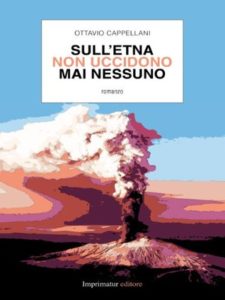(Sull’Etna non uccidono mai nessuno)
Ottavio Cappellani

‘Cappellani creates a plot in which myth and reality become confused while in the background the Volcano inspires beliefs able to ensnare even the most astute reader.’ Repubblica
The “Cassiopea” is moored in the port of Catania, one of the many boats that in the summer takes to the sea full of tourists for them to admire the most iconic points of the coast or to visit the nearby islands. The business is run by Ernesto and Vito, who live all year round on the boat. Ernesto – disillusioned ex writer, thick gray curly hair that makes him look like a pagan god – narrates the deeds of of gods in front of an audience of naive tourists who go into raptures about everything that seems vaguely “cultural” or “typical”. Vito, on the other hand, is the skipper, the one who takes care of the boat and all practical matters. Given the tough times, they decide to extend their activities into winter, offering excursions to Etna. Four young Milanese upper class boys contact them to be accompanied to Etna in search of the sister of one of them, who mysteriously disappeared on the volcano with her son. An alarm bell rings in Ernesto’s head: nothing ever happens on Etna, and if something happened this time it means that in Olympus the gods must be in turmoil. He doesn’t like it at all. But the tempting pay, his propensity to get into trouble and a certain disenchanted vision of life, push him to accept.
This well paced novel keeps you turning the pages to the end. It has all the hallmarks of classic noir: the borderline protagonist and his difficult relationship with women, the fake tracks, the final denouement. But the plot is a pretext to convey something else and, just as Ernesto enchants tourists with ancient Greek myths, Cappellani takes us to the mountain, a mythical and primordial place where men revert to their original instincts and the law of the strongest prevails. The “monsters” live on the mountain, monsters or gods, they are always otherworldly creatures, which require human sacrifices to survive. A ruthless investigation into the nature of man that arrives at somewhat pessimistic but dramatically real conclusions.
Sales: Imprimatur Italy (150pp)